Reporter, Comayagua, Honduras
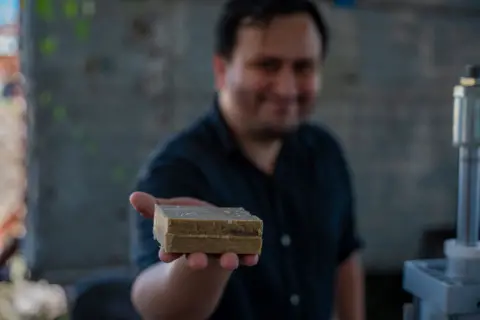 Fritz Pinnov
Fritz PinnovA few 27-year-olds look at used cooking oil and see a green business opportunity for the production of soap or dog food.
But that is what Hugo Daniel Chavez is, a project manager for NGO Sunment Honduras.
“We have so many companies and homemade waste practices, so we try to transform waste and give it another life,” he tells the BBC.
Around Latin America, several million tons of oil cooking is consumed every year. It is often used to fry food, mostly chicken, plantation tapes, chips and pork.
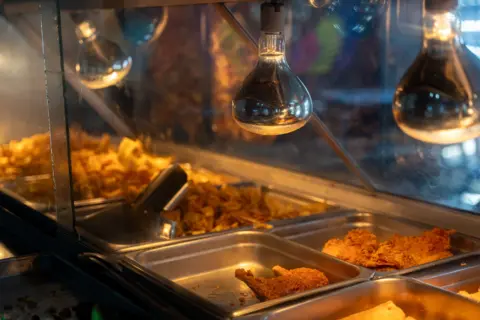 Fritz Pinnov
Fritz PinnovBut it is again reused and heating – as often the case in Honduras, where there is a huge black market for the cooking oil – can create compounds that are bad for consumer health.
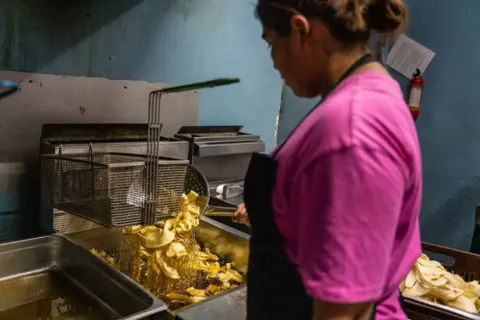 Fritz Pinnov
Fritz PinnovIncorrectly rejected, it can also have a massive detrimental effect on the environment.
If a sink is dropped, it can damage the pipes and contaminate groundwater, and when thrown next to the road, it can contaminate freshwater and crops many communities.
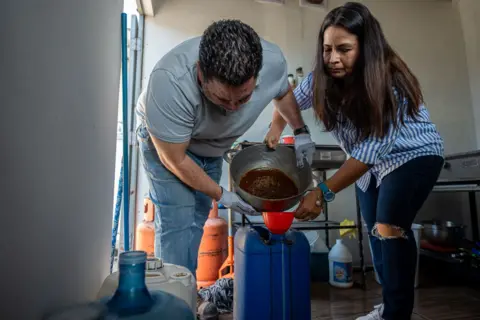 Fritz Pinnov
Fritz PinnovFaced with these health and ecological dangers, young entrepreneurs who tried to deviate from the substrates who tried to smell a solution that should not encourage them to properly dispose of their oil and properly, but also these services waste into something useful.
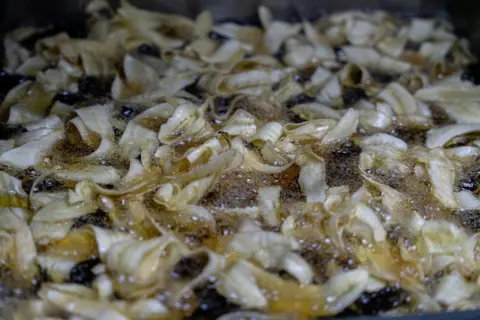 Fritz Pinnov
Fritz PinnovThe CEO of NGOs, Ricardo Pineda, explains that their idea comes from earlier efforts by various companies and organizations to transform the cooking oil in biodiesel. “But we don’t have a market for biodiesel in Honduras,” he says.
“So, we decided to produce products that I can do on our home markets (such as soap and dog food).”
To make it more attractive to people to be leaning legally, instead of selling it to unscrupulous customers, soul offers to buy used cooking oil and pick it up from the shops that participate in their project.
Their efforts have gained international recognition, especially when they were awarded 20,000 dollars as one of the winners of 2023. year, a global initiative led by the Italian government and the United Nations Development Program.
Sunmentar also receives funds from the Netherlands Embassy, which told the BBC, because “their project offered an innovative and sustainable solution, using an entrepreneurial approach that has a social impact.”
“IT (their project) not only contributes to the impact on the environment emphasis on creating a circular economy, but also authorizes young and women – groups most affected by climate change – and generates green work affairs.”
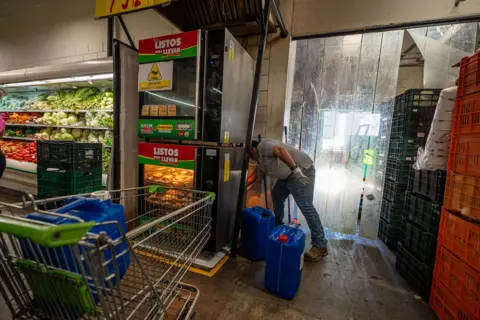 Fritz Pinnov
Fritz PinnovSunsenta offers between 2.50 and 3.50 lempires (0.08 £ 0.11) per kilogram of used cooking oils.
And that is not just a small business dealing.
In May 2024. NGO NGO signed a contract with the Mexican and the central American division of retail Giant Walmart.
This contract guarantees the flow of use of cooking and grease of all companies related to Valmart in Sunmentation, which Mr. Pineda says it is critical for Sunmentar’s project.
“We need a reliable production stream for production. (…) Otherwise, quickly, we could run out of the cooking oil, due to the black market that competes with us”, adds Chavez.
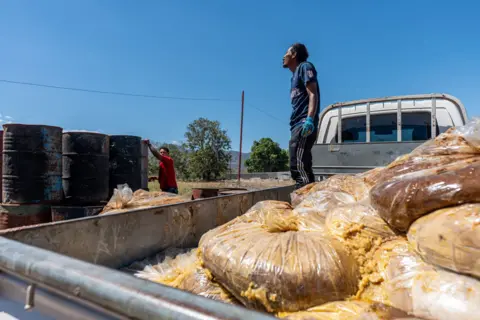 Fritz Pinnov
Fritz PinnovIt then brings cooking oil and fat in the plant in Comayagu, where they are purified and processed in the reaction known as saponification. This process combines fat or oil with alkaline to produce soap.
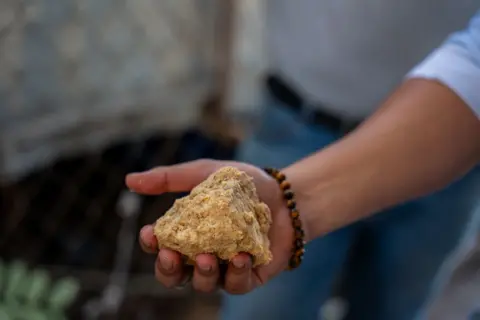 Fritz Pinnov
Fritz PinnovMr. Pineda says it is from the Survinja to develop a “circular ecological system in which we use everything again”.
“In addition to our plant that produces food and dogs, someone else has a water purification plant and use the water that the plant cannot purify, so to say, for our water cooling system,” he explains.
 Fritz Pinnov
Fritz PinnovThe idea of joining Walmart, says G. Pineda, is “selling dog food and soap we wounded from their waste in Walmart”.
“They could profit from their own waste and also see the economic value behind the circular economies,” he says BBC.
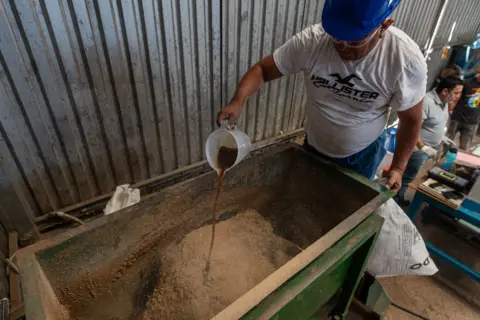 Fritz Pinnov
Fritz PinnovOn 15 lempiras (0.45 pounds) of soap, the project consists of a monthly income of over 106,000 lempirations (3.194.70 pounds), which excludes fixed costs such as salaries, commissions and distributions.
Mr. Pineda emphasizes that “money does not stay with us.” “We only help me implement the project and as soon as we do and we are looking for new opportunities,” he says.
The recycling of cooking oil is just only a few projects working at the same time in the system.
 Fritz Pinnov
Fritz PinnovThe organization consists of young people, all under 30 years and averaged 23 years, and their youthful enthusiasm and impatience with established ways of work are key to their approach.
“We started as a young group that was sick about regular ways in which large institutions are processed with climate change and environmental problems,” says G. ” Pineda.
“We want to create real solutions and don’t sit around just talking about what could be done.”
Their strategy also differs from other youth organizations for environmental protection in the region, which often focused on a confrontation approach, trying to stop large mining or energy projects and hold politicians responsible for corruption.
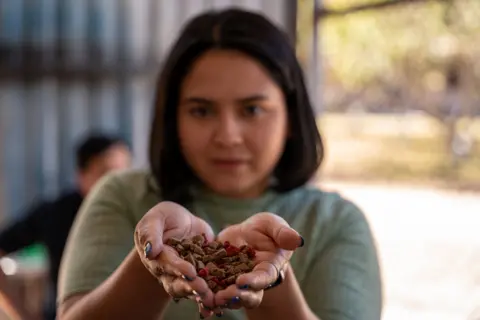 Fritz Pinnov
Fritz PinnovBut the coordinator of Sunment’s projects, Paola Acevedo, says that two approaches are in the chance, but complement each other: “This type of (classical) environmental ecological environmental environmental is very important and there is no doubt that we need it.”
“We try to focus on solutions, while the others are fighting on the front,” she added.






